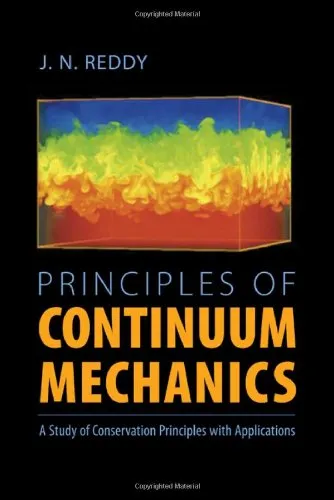Principles of Continuum Mechanics: A Study of Conservation Principles with Applications
4.3
Reviews from our users

You Can Ask your questions from this book's AI after Login
Each download or ask from book AI costs 2 points. To earn more free points, please visit the Points Guide Page and complete some valuable actions.Related Refrences:
Introduction
Principles of Continuum Mechanics: A Study of Conservation Principles with Applications is a comprehensive and meticulously structured book that delves deep into the fundamental pillars of continuum mechanics. Written by J.N. Reddy, this book serves as an indispensable resource for students, researchers, and professionals in engineering and applied sciences who seek a thorough understanding of the governing principles of mechanics as they pertain to continuous matter. The prime focus of the book is the systematic development of the governing equations rooted in conservation principles, the axioms of physics, and constitutive relations.
The book bridges the gap between theoretical constructs, such as kinematics and balance laws, and their real-world applications in engineering disciplines like fluid mechanics, solid mechanics, and thermal sciences. What sets this book apart is its ability to present sophisticated topics in a structured and logical manner, making them accessible and relevant to readers with varying levels of expertise. The use of clear mathematical formulations, illustrative examples, and step-by-step derivations ensures that the reader develops both a conceptual and practical grasp of continuum mechanics.
In this book, J.N. Reddy has focused on the unifying nature of conservation laws: laws of mass, momentum, energy, and entropy. These principles provide the foundation for understanding complex natural phenomena and engineering systems. Whether you are a novice eager to learn or an industry professional refining your expertise, the book equips you with the tools to apply continuum mechanics effectively in various fields.
Detailed Summary of the Book
The book is structured in a way that guides the reader from foundational concepts to advanced applications in continuum mechanics. In the early chapters, the focus lies on understanding motion, deformation, and fundamental mathematical tools, such as tensors, which are essential for describing the mechanics of continuous media. The author employs a systematic approach to introducing vector and tensor algebra, which lays the groundwork for exploring kinematics, stress analysis, and the balance laws.
Subsequent chapters delve into the core conservation principles that govern continuous media. Detailed derivations of conservation of mass, momentum, angular momentum, energy, and entropy are presented along with physical interpretations. By formulating these principles in both integral and differential forms, the book demonstrates their applicability across fluid dynamics, elasticity, plasticity, and heat transfer.
Readers are also introduced to constitutive theories, which provide the necessary relationships between stresses and strains, extending the analysis to real-world materials under varying thermal and mechanical conditions. The book culminates in discussions about non-linear problems, variational principles, and numerical methods, highlighting a range of applications and advanced topics while maintaining that solid mathematical rigor.
Key Takeaways
- A detailed and logical development of continuum mechanics principles.
- A balanced emphasis on theoretical rigor and practical applications.
- Comprehensive coverage of conservation principles, including mass, momentum, energy, and entropy.
- Illustrative use of tensors, kinematics, stress measures, and constitutive equations.
- Step-by-step derivations with real-world engineering examples.
- In-depth analysis of variational principles and numerical methods.
Famous Quotes from the Book
"Continuum mechanics is not merely a study of the deformation of matter—it is a framework for understanding the physical laws of the universe as they manifest in continuous media."
"The unifying principles of mass, momentum, energy, and entropy ensure that mechanics is not limited by the boundaries of conventional disciplines."
Why This Book Matters
Principles of Continuum Mechanics is more than just a textbook; it is a reference guide that highlights the elegance and utility of mathematical physics in explaining natural phenomena and solving engineering problems. The book provides an essential foundation for any advanced coursework or research in mechanics, including elasticity, fluid dynamics, thermodynamics, and computational mechanics. By emphasizing the interconnections among physical laws, this work fosters a deeper appreciation of the unified nature of engineering and scientific disciplines.
Furthermore, J.N. Reddy simplifies highly intricate topics and makes them accessible without compromising their depth—a hallmark of great academic writing. As a result, this book has immense value in classroom settings, independent study, and professional practice. Students will find it an excellent entry point into continuum mechanics, while practitioners can rely on it for thoughtful problem-solving approaches and a robust theoretical framework.
Ultimately, this book matters because it fosters a deeper understanding of the principles that govern our physical world, empowering readers to address practical challenges in engineering and science confidently.
Free Direct Download
You Can Download this book after Login
Accessing books through legal platforms and public libraries not only supports the rights of authors and publishers but also contributes to the sustainability of reading culture. Before downloading, please take a moment to consider these options.
Find this book on other platforms:
WorldCat helps you find books in libraries worldwide.
See ratings, reviews, and discussions on Goodreads.
Find and buy rare or used books on AbeBooks.
1220
بازدید4.3
امتیاز0
نظر98%
رضایتReviews:
4.3
Based on 0 users review
Questions & Answers
Ask questions about this book or help others by answering
No questions yet. Be the first to ask!





![The Ultimate iOS Interview Playbook: Conquer Swift, frameworks, design patterns, and app architecture [Team-IRA]](https://s3.refhub.ir/images/thumb/The_Ultimate_iOS_Interview_Playbook__Conquer__29925.webp)







